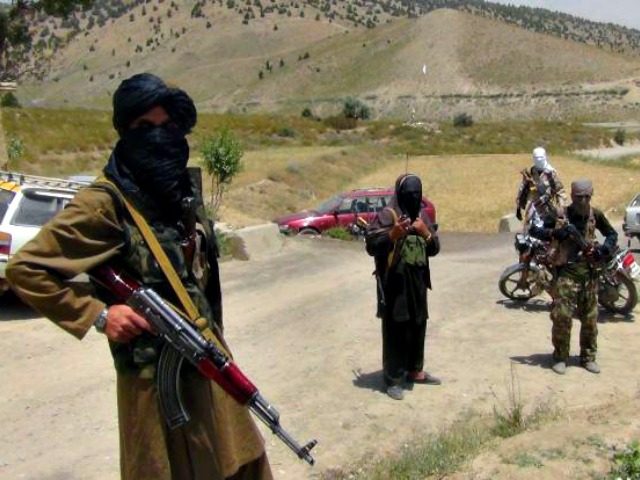President Trump’s decision to withdraw 7,000 troops from Afghanistan, possibly leading to a complete withdrawal of U.S. forces from that country in the near term, is correct.
The Taliban insurgency there has already replaced the National Unity Government in much of the country, while the government itself has proven to be incapable of standing on its own after 17 years of American and international efforts to enable it to do so. The president has long argued that the war in Afghanistan is a no-win situation. Popular sentiment tracks with the president’s view and his decision. A majority of servicemembers and veterans also agree that this war has been going on too long.
The foreign policy establishment warns that Afghanistan will once again become a “safe haven” for international terrorist organizations if the U.S. departs. But as the Taliban is currently fighting the so-called ISIS branch in Afghanistan, ISIS-Khorasan, the president is appropriately suspicious of these experts’ claims.
In the 1990s, Osama bin Laden did select and indoctrinate recruits from his residences in Afghanistan’s remote tribal areas. His relationship with the Taliban was an uneasy one though. The Taliban’s leader, Mullah Omar, likened the reclusive sheikh to a “chicken bone” lodged in his throat.
The truth, as the 9/11 Commission Report clearly outlines, is that the mastermind of the attacks – Khalid Sheik Mohammed and his operatives – met all throughout Western Europe, the Near East, and South Asia. The hijackers staged out of Hamburg, San Diego, Miami, and – near walking distance from the National Security Agency – in Laurel, Maryland. The Saudi national, bin-Laden, managed a multi-national terror network. His objectives were international.
The Taliban’s motivations were centered entirely around local concerns. After September 11, they offered to surrender bin Laden to any country other than the U.S. after the attacks. It has become clear that they do not share common cause with terror organizations and they certainly lack a tolerance for new, external groups.
The emergence of the black banners of the Islamic State in Nangahar Province during late 2014 appeared to validate the “safe haven” narrative. U.S. Forces were withdrawing, Operation Enduring Freedom had come to a close, and a new terror organization seemed to be establishing itself.
The composition of IS in Khorasan, under closer examination though, did not consist of Iraqis, Syrians, or Saudis but rather a host of former, mid-level commanders of the Pakistani Taliban (TTP). Other fighters and commanders hailed from Lashkar-e-Islamand the Islamic Movement of Uzbekistan (IMU). As Vanda Felbab-Brown, senior fellow from the Brookings institute, recently explained, these fighters “Embrace the label…but there isn’t much evidence of centralized command and control links between fighters in Afghanistan and the leadership in Iraq and Syria yet.”
These groups share regional conflict in place of international terrorism as a common element. ISIS regalia is well suited for rebranding and propaganda, but it won’t diminish the fact that the Taliban, with a political office and a chance at renewed political legitimacy, have the greatest incentive to hold their ancestral lands and ward off outsiders. President Trump is wise to let Pashtun tribesmen sort matters out amongst themselves while bringing U.S. forces home.
In an interconnected world, attacks can originate in most any country, as the September 11th attacks proved. Occupying Afghanistan indefinitely will not prevent future attacks, but it will ensure that budding extremists around the globe have ample ideological motivation to mount new offensives. The post-September 11th massacres perpetrated by Maj. Nidal Hasan, the Tsarnaev brothers, and Omar Mateen, among others, show that continuing to fight over there has continued to motivate further terrorist attacks against civilians here.
In noting that Russia lost its empire due to economic decline, in part precipitated by their war in Afghanistan in the 1980s, it is clear that President Trump understands the perils associated with a prolonged occupation. In his reference to previous failed campaigns by the British in Afghanistan, he demonstrates an awareness concerning the historically impossible task of pacifying Pashtun tribesmen. The president clearly differentiates between regional factions and international groups that actually pose a threat to the United States.
Trump is right to seek an end to America’s role in this conflict. He should bring U.S. soldiers, marines, sailors, and airmen home now.
Robert Gaines is an IT Professional and ten-year veteran of the US Air Force and Air National Guard. He served with U.S. and coalition forces in Iraq and Afghanistan as an embedded liaison for ground combat operations.
Scott Horton is editorial director of Antiwar.com, host of Antiwar Radio on KPFK 90.7 FM in Los Angeles, director of the Libertarian Institute and the author of Fool’s Errand: Time to End the War in Afghanistan.

COMMENTS
Please let us know if you're having issues with commenting.